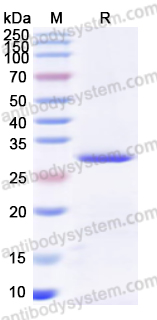Catalog No.
YHB99602
Expression system
E. coli
Species
Homo sapiens (Human)
Protein length
Gly20-Leu255
Predicted molecular weight
29.46 kDa
Nature
Recombinant
Endotoxin level
Please contact with the lab for this information.
Purity
>90% as determined by SDS-PAGE.
Accession
P02708
Applications
ELISA, Immunogen, SDS-PAGE, WB, Bioactivity testing in progress
Form
Lyophilized
Storage buffer
Lyophilized from a solution in PBS pH 7.4, 0.02% NLS, 1mM EDTA, 4% Trehalose, 1% Mannitol.
Reconstitution
Reconstitute in sterile water for a stock solution.
Shipping
In general, proteins are provided as lyophilized powder/frozen liquid. They are shipped out with dry ice/blue ice unless customers require otherwise.
Stability and Storage
Use a manual defrost freezer and avoid repeated freeze thaw cycles. Store at 2 to 8°C for frequent use. Store at -20 to -80°C for twelve months from the date of receipt.
Alternative Names
ACHRA, Acetylcholine receptor subunit alpha, CHRNA1, CHNRA
PAI1 regulating CHRNA1 contributes to primary focal hyperhidrosis: Clinical and experimental studies., PMID:40503176
Discovering Novel Biomarkers and Potential Therapeutic Targets of Amyotrophic Lateral Sclerosis Through Integrated Machine Learning and Gene Expression Profiling., PMID:40304918
The effect of Miya on skeletal muscle changes by regulating gut microbiota in rats with osteoarthritis through AMPK pathway., PMID:39736635
Regulation of miR-206 in denervated and dystrophic muscles, and its effect on acetylcholine receptor clustering., PMID:39575567
Molecular determinants of skeletal muscle force loss in response to 5 days of dry immersion in human., PMID:39450600
Scaffold-Forming Collagen and Motor-Endplate Expressing Muscle Cells for Porcine Laryngoplasty., PMID:39011835
Exploring the mechanism of cytisine in treating respiratory depression following venomous snake bites based on network pharmacology and molecular docking., PMID:38715819
Effects of DDT and DDE on placental cholinergic receptors., PMID:38615785
Transcriptome profile of subsynaptic myonuclei at the neuromuscular junction in embryogenesis., PMID:37994470
PAI1 inhibits the pathogenesis of primary focal hyperhidrosis by targeting CHRNA1., PMID:37542348
HuR Promotes the Differentiation of Goat Skeletal Muscle Satellite Cells by Regulating Myomaker mRNA Stability., PMID:37108057
Identification of diagnostic biomarks and immune cell infiltration in ulcerative colitis., PMID:37055577
Muscle and Muscle-like Autoantigen Expression in Myasthenia Gravis Thymus: Possible Molecular Hint for Autosensitization., PMID:36979710
Molecular and Physiological Functions of PACAP in Sweat Secretion., PMID:36902003
Molecular and Functional Changes to Postsynaptic Cholinergic Signaling in the Vestibular Sensory Organs of Aging C57BL/6 Mice., PMID:36840917
Clinical and Pathologic Features of Congenital Myasthenic Syndromes Caused by 35 Genes-A Comprehensive Review., PMID:36835142
A novel phenotype of AChR-deficiency syndrome with predominant facial and distal weakness resulting from the inclusion of an evolutionary alternatively-spliced exon in CHRNA1., PMID:36634413
Congenital Myasthenic Syndromes in Turkey: Clinical and Molecular Characterization of 16 Cases With Three Novel Mutations., PMID:36099689
CHRNA1 induces sarcopenia through neuromuscular synaptic elimination., PMID:35809807
Miya Improves Osteoarthritis Characteristics via the Gut-Muscle-Joint Axis According to Multi-Omics Analyses., PMID:35668932
Pregnancy outcomes in patients with congenital myasthenic syndromes., PMID:35661384
Transcriptomic analyses of NeuroD1-mediated astrocyte-to-neuron conversion., PMID:35606902
Slow Channel Syndrome Revisited: 40 Years Clinical Follow-Up and Genetic Characterization of Two Cases., PMID:35466948
Antagonist of Chrna1 prevents the pathogenesis of primary focal hyperhidrosis., PMID:35393764
Nicotinic acetylcholine receptors in a songbird brain., PMID:35344610
Identification of Hub Genes Associated with COPD Through Integrated Bioinformatics Analysis., PMID:35273447
Identification of genetic risk loci and prioritization of genes and pathways for myasthenia gravis: a genome-wide association study., PMID:35074870
Treatment of slow-channel congenital myasthenic syndrome in a Thai family with fluoxetine., PMID:34999496
Congenital myasthenic syndrome: Correlation between clinical features and molecular diagnosis., PMID:34749429
Mutual stimulatory signaling between human myogenic cells and rat cerebellar neurons., PMID:34713978
The Importance of Multiple Gene Analysis for Diagnosis and Differential Diagnosis in Charcot Marie Tooth Disease., PMID:34169998
Rapid Generation of Pigment Free, Immobile Zebrafish Embryos and Larvae in Any Genetic Background Using CRISPR-Cas9 dgRNPs., PMID:34077687
CHRNA1 promotes the pathogenesis of primary focal hyperhidrosis., PMID:33476802
Slow-Channel Congenital Myasthenic Syndrome due to a Novel Mutation in the Acetylcholine Receptor Alpha Subunit in a South Asian: A Case Report., PMID:33216040
A novel PAI-1 inhibitor prevents ageing-related muscle fiber atrophy., PMID:33213843
Widespread Evolution of Molecular Resistance to Snake Venom α-Neurotoxins in Vertebrates., PMID:33023159
Phylogenetic relationships between different raccoon dog (Nyctereutes procyonoides) populations based on four nuclear and Y genes., PMID:32725576
The ACE2 expression in Sertoli cells and germ cells may cause male reproductive disorder after SARS-CoV-2 infection., PMID:32594644
Evolutionary Interpretations of Nicotinic Acetylcholine Receptor Targeting Venom Effects by a Clade of Asian Viperidae Snakes., PMID:32394055
Increased serum acetylcholine receptor α1 subunit protein in anti-acetylcholine receptor antibody-positive myasthenia gravis., PMID:31855720
Fatigue scores correlate with other self-assessment data, but not with clinical and biomarker parameters, in CIS and RRMS., PMID:31586802
Muscle acetylcholine receptor conversion into chloride conductance at positive potentials by a single mutation., PMID:31570625
Blocking skeletal muscle DHPRs/Ryr1 prevents neuromuscular synapse loss in mutant mice deficient in type III Neuregulin 1 (CRD-Nrg1)., PMID:30870432
Physiological Expression of Ion Channel Receptors in Human Periodontal Ligament Stem Cells., PMID:30845727
Profiling of patient-specific myocytes identifies altered gene expression in the ophthalmoplegic subphenotype of myasthenia gravis., PMID:30696470
Conditional Inactivation of Nf1 and Pten in Schwann Cells Results in Abnormal Neuromuscular Junction Maturation., PMID:30478082
Homogeneity of Different Functional mRNA Indicators for Wound Age Estimation., PMID:30468050
Clinical Reasoning: A child with arthrogryposis: Congenital myasthenic syndrome-CHRNA1 mutation., PMID:30177536
Mutated cancer autoantigen implicated cause of paraneoplastic myasthenia gravis., PMID:29742813

